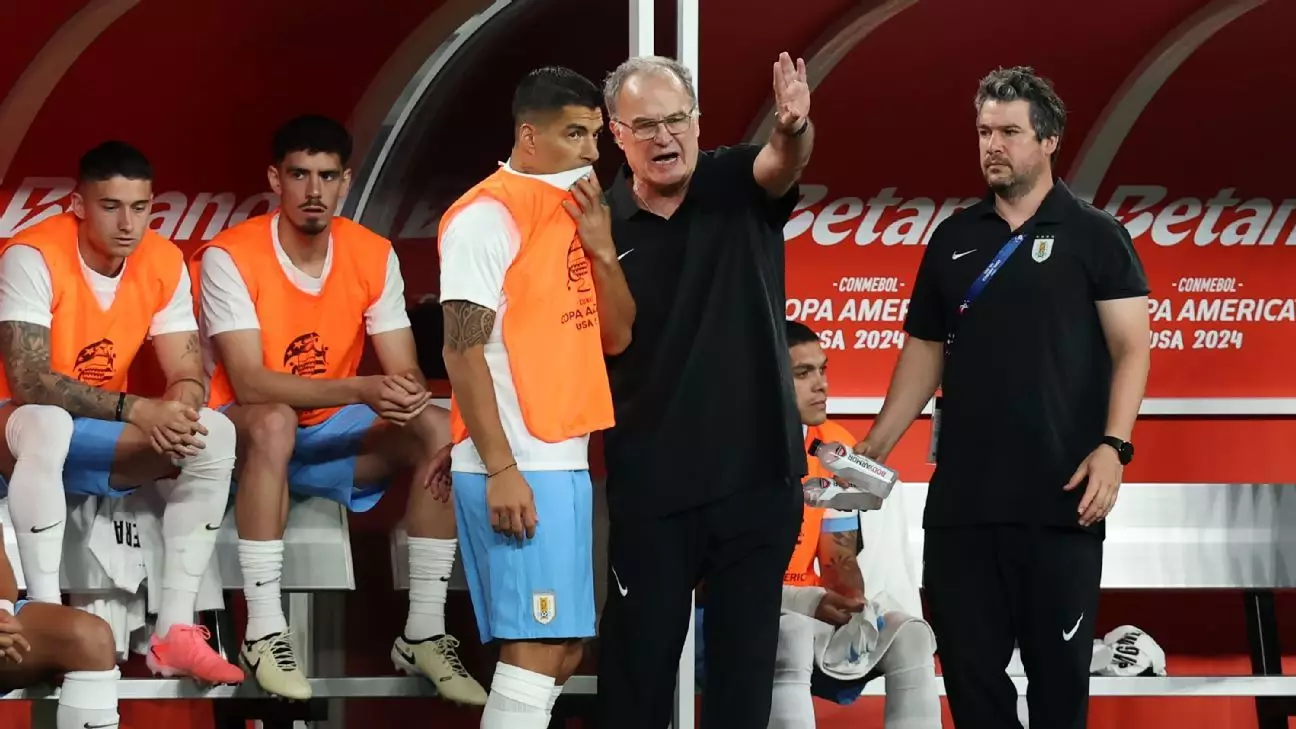Luis Suárez, a legendary figure in Uruguayan football, recently vocalized his concerns surrounding the coaching tactics of Marcelo Bielsa during the 2024 Copa América. His revelations paint a troubling picture of the conditions that players endured under Bielsa’s leadership, suggesting that issues extend beyond mere tactics on the field. Suárez’s comments raised eyebrows not only among fans but also within the footballing community, as they showcased a stark divide between the idealized image of national unity and the uncomfortable truth of internal discord.
According to Suárez, Bielsa imposed strict measures that inhibited players’ interactions with team staff, leading to a culture of disconnect. Restrictions such as employees being barred from greeting players and the formality enforced even at points of entry into training facilities struck Suárez as dehumanizing. By sharing these experiences during an interview on DirecTV’s „De fútbol se habla así,“ he urged the public to consider the personal toll these dynamics may take on the athletes representing the nation.
Suárez went on to elaborate on another vital aspect that could have dire implications—inadequate communication between the coaching staff and players. He indicated that during the Copa América, a void in dialogue exacerbated tensions within the team. His emotional recounting of players who felt compelled to formally request basic greetings from Bielsa—often even met with silence—highlights a systemic issue within the team’s ecosystem. It calls into question the very foundation of teamwork, which thrives on mutual respect and open communication.
Moreover, Suárez, in a moment of discontent, recounted an incident in which Bielsa discouraged players from interacting with fans. This seemed to clash with the spirit of football as a community-driven sport. Suárez’s insistence on maintaining those connections revealed a profound understanding of the game’s cultural significance beyond tactical decisions. National teams thrive on a shared sense of pride and unity, and when that is stripped away, it can lead to an existential crisis within the squad.
Despite these concerning dynamics, Suárez noted that the team achieved third place in the Copa America, demonstrating that results can sometimes mask deeper issues. The statistics might suggest success, but their bittersweet taste reveals that the victories may wear a heavier cost in terms of player morale and cohesion. Suárez’s juxtaposition of results vs. the internal situation serves as a reminder that success in sports is not merely measured by trophies but also by the well-being of those who strive for victory.
His talk with Bielsa—which lasted a mere five minutes—underscores a stark reality: that the hope for improvement may not find fertile ground if communication remains limited. Suárez’s plea for understanding from fans during the upcoming 2026 World Cup qualifiers adds another layer to the conversation. As Uruguay navigates this transitional phase while currently sitting third in the Conmebol rankings, patience will be key, especially if players are to perform optimally amidst these challenges.
As the struggle within the Uruguay national team continues to unfold, Suárez’s reflections provoke a critical examination of coaching styles and their tangible impacts on player performance and morale. The future rests on balancing the demands of rigorous training and maintaining an environment where every player feels valued and heard. As La Celeste prepares to clash with Peru on October 11, attention shifts towards not just the outcome of the game but the collective emotional state of the team moving forward.
In sport, as in life, success is seldom achieved in isolation. Suárez’s call for understanding from fans resonates deeply amidst a backdrop filled with high expectations and emotional investment. The poignant tale of challenges faced during Bielsa’s regime not only serves as a cautionary tale regarding leadership but also reinforces that football is, fundamentally, a communal endeavor. As Uruguay strives for success, perhaps they will remember that victories are far more meaningful when shared both on and off the pitch.


Napsat komentář